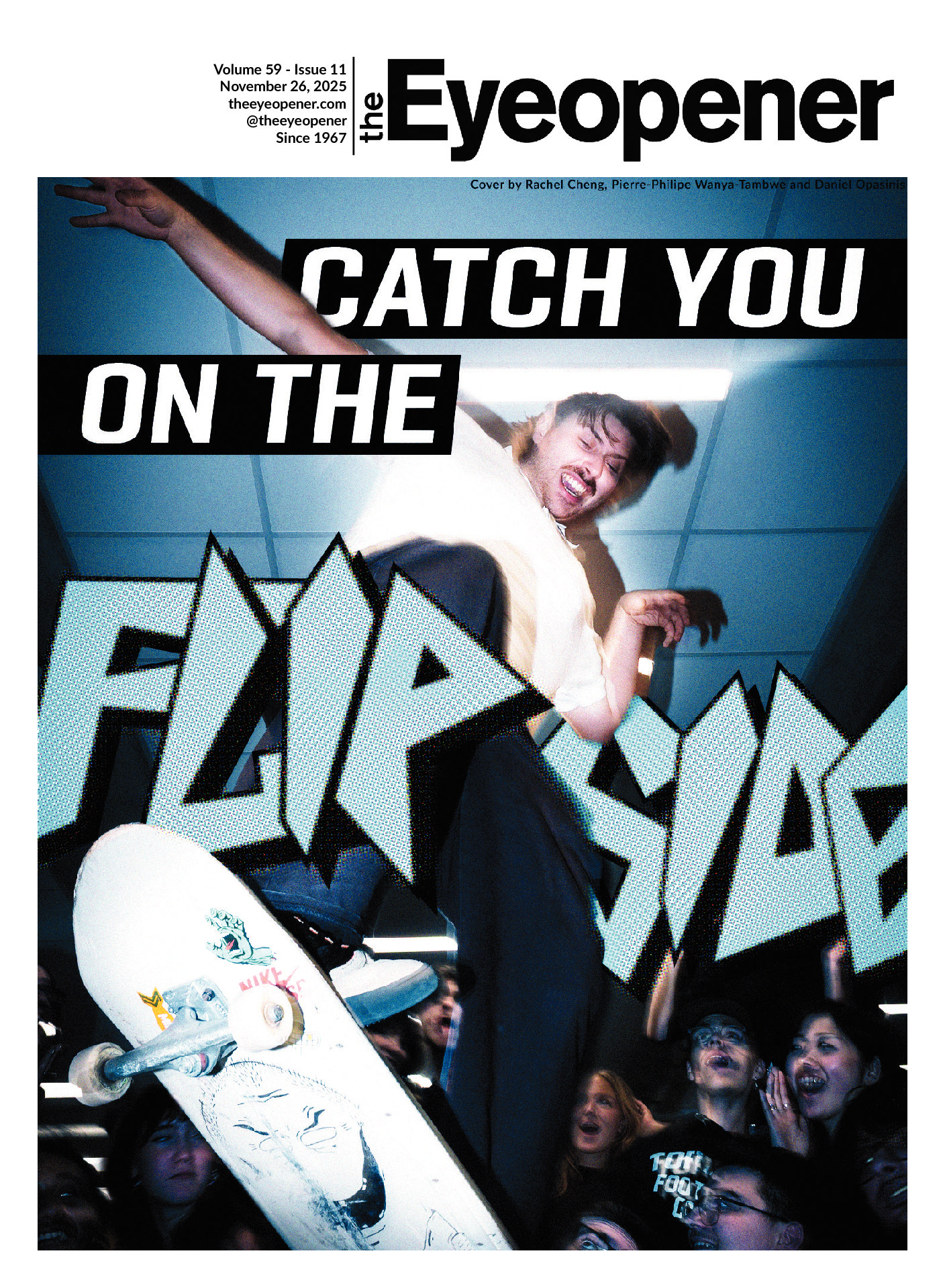By Victoria Iarocci
On Sunday afternoons, Paradise Bound Records in Kensington Market is packed with eager thrifters.
Small oil paintings and ancient vinyl records crowd the walls. Owner Coyote Grey has large, staring eyes like his animal counterpart. He incessantly burns fragrant incense on his massive table stacked with records and CDs. A young couple sifts through different genres of music on vinyl that sits in record crates.
The man is clad in a worn out plaid shirt and Levi’s jeans that look like a relic from the ’70s. She is wrapped in a brown vintage skirt, her hair covered in unkempt brown curls. “Do you have Devo’s Devo Corporate Anthem off the album Duty Now for the Future?” he asks Grey. “She’s never heard it before.” Grey spins it on his turntable. Marching music, intertwined with ’60s psychedelic guitar riffs, permeates the air. Both men laugh along with another male record sifter a couple crates down. He sports huge earrings and a wood beaded necklace that almost strangles his neck. The guy in plaid chats with Grey and the man with the beaded necklace.
“Look what I found: an original ’67 pressing of Sgt. Pepper,” he says, clasping the original Beatles classic. Sgt. Pepper takes Devos’s place on the turntable. “You’ve got to love Ringo,” says the man with the beaded necklace, before he breaks out in song. “What would you do if I sang out of tune? Would you stand up and walk out on me?” His crooning is sub-par, but not a single customer leaves. Grey encourages vocal release from his customers. “The thing that makes me the happiest is when someone finds something that makes them sing. That’s why I am not so opinionated about music in general.”
Like many thrift store owners, Grey enjoys tracking down objects for customers to cherish. Kensington Market, located in Toronto’s west end, is one of the oldest parts of the city, dating back to the 1800s. It’s composed of only a few narrow streets, packed with cultural and vintage stuffs. The tiny streets glitter with hand-painted store signs. Sidewalk stands teem with vegetables. Old clothing racks sag with samples of fashion spanning decades.
On Baldwin Avenue, Global Cheese emits odors of foreign cheeses. It is a haven where aspiring bohemians can shop their little hearts out. Toronto is on the edge of spring, and people are not only seeking new music, but also stylish clothing for warmer weather. Kensington offers more affordable clothing and music in comparison to giant music retailers like HMV and clothing stores like the Gap and H&M. They tend to be expensive and their employees can offer little assistance when trying to find quality duds. Storeowners in Kensington assist shoppers on a more intimate level, helping to track down the ‘perfect’ find.
On the other hand, chains which offer mass-marketed merchandise differ drastically in size, quality and customer appreciation. Many thrifters view Yonge and Dundas as a concrete jungle, where retail kings spawn bland, expensive clothing. Places along this main drag employ shiny people to stand at the front doors to mechanically recite salutations, leaving shoppers to assume employees are only cordial to make a sale. “There is a certain amount of sterileness at the Gap. It’s only boring stuff that is mass-marketed and mass-produced,” says avid thrift shopper Stephanie Lipinski. This is why she chooses Kensington.
International fashion retailer H&M takes Gap-inspired “customer service” to new levels — its employees only maintain the interior of the store, never approaching customers. “H&M provides indirect customer service; this is what it is like in Europe. Head office in Sweden said that Canadians are too needy,” says Elissa Ellins, one of the head visual merchandisers at the H&M store on Yonge and Bloor. This makes it the customer’s job to sift through three floors’ worth of merchandise on their own, without any feedback from distracted store workers. Customers can never win in this retail world. Merchandise can be expensive, and they are either hounded or completely ignored by sales staff — two maladaptive forms of miscommunication that can leave the customer with no good finds.
Are employees ever interested in helping customers find stuff they can love for the sake of it? Helen Gilbert, one of a trio who own Bungalow on Augusta Avenue in Kensington, believes the people who care are passionate about fashion. She has been helping people fit into jeans properly and find their own styles since the ’60s. Today, her 4-foot-9 frame wears fitted jeans and a colorful beanie cap. Her fascination with clothing was triggered by her grandmother’s “rag bags.”
These were stored in the attic, full of discarded clothes that would soon be made into rags. “I have always been a vintage clothing freak,” Gilbert says. She admits to stealing from the bags and admiring the buttons, hems, and beautiful cut of the garments about to be put to waste. Bungalow’s interior is aged to perfection. The scuffed-up linoleum flooring is presumably a cast-off of the 60s. The store smells of mothballs, like an older relative’s basement. Orange psychedelic lights hang from the ceiling, emitting a slight glow. The back corner features racks of dresses, leather jackets and old fur coats. Gilbert values all her customers.
Some are in their 30s, but have been browsing at her vintage shops since they were kids. “Store owners need to know their customers, you need to know what their needs are. You don’t have to be friends with them — there are people around who have been trusting me since the ’70s.” Gilbert, like other owners, wants to see her customers find stuff that suits them. “This woman was looking at a bunch of red cowboy shirts I had. She was determined to buy one of them, but I told her that they were all too big for her. She bought the one she wanted but I haven’t seen her since.” Helen suspects that the woman realized when she got home the shirt did look terrible.
A lot of shoppers believe that thrift owners set up shop because of their sheer love for quality vintage. “I always recognize the staff at Courage My Love in Kensington. I knew some girls who worked there, Rose, and the girl with the big glasses and the dreads. They helped me find a lot of good stuff that I have kept. It felt like it was my spot,” Lipinski says. Employees like Rose and her dreaded cohort spend more quality time servicing customers, while in huge retail stores, relationships between client and storeowner rarely happen.
The volume of shoppers coming in is just too great. The employee turnover rate is also quite high. Many music enthusiasts can also thank shop owners for their fabulous record collections. Transplanted Torontonian Ryan Burt recalls wonderful moments at a record shop in his hometown of Owen Sound called Randy’s Records, whose prices were always negotiable. Burt says Randy always gave personal recommendations, and informed his customers about records he thought they would like.
“I have met guys struggling with their business, who didn’t give a shit about the money as much as being friendly and helpful,” Burt says. Since his move to Toronto, Burt shops at Paradise Bound, where Grey always acknowledges him with a hello. However, some shoppers detest the searching aspect that comes with vintage shopping.
“I don’t think shopping is a social thing, I like to go in, grab it and buy it,” says financial adviser Stephanie Fournier, who is generally disgusted by thrift shopping. There is a level of quality a shopper cannot obtain from just sticking to the H&Ms and Gaps of the city. A lot of the merchandise you see in thrift stores is uniquely artistic, having been restored, and is often handmade. Gilbert of Bungalow despises the Surger, a sewing machine that whips off clothing fast, but without the care that would keep them from falling apart.
“People don’t take time to make quality handmade clothing anymore,” he says. Recycling is also tied into the trend of thrift. “They recycle stuff at Courage my Love. My friend and I fought over these multicolored arm warmers for a year. They were made out of different sweaters,” thrifter Lipinski says. Grey at Paradise Bound buys into the philosophy as well. “I have saved thousands of albums from taking a faster route to the landfill,” he says.
He also leaves out old, cracked CD cases each week to be picked up for recycling. Thrift stores are mainly frequented by college and university students, who struggle with keeping stylish on limited funds. Students can find anything from blue-checkered hip-huggers to psychedelic artwork, all at reasonable prices.
The relentless vintage scavengers at Paradise Bound keep prowling for buried treasure well into the evening. The man in plaid doesn’t buy Sgt. Pepper or Devo’s Duty Now for the Future, content to have heard them on the turntable.
His girlfriend continues searching for the quintessential Frank Sinatra compilation.











Leave a Reply